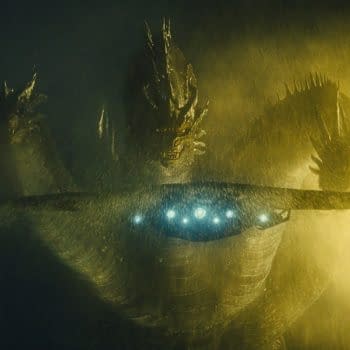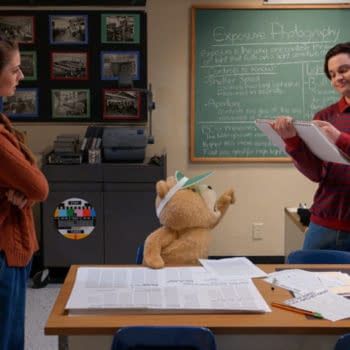Posted in: Movies, Review | Tagged: film, HRL, movie, murder on the orient express, Review
Murder On The Orient Express Review: Solid, But Shows Its Age
Murder on the Orient Express, based on the classic mystery novel by Agatha Christie and put through the lens of director Kenneth Branagh (who also plays the lead role of Hercule Poirot), is a beautiful adaptation — but still carries with it the eccentricities of having been written in 1934. Now, before racing to the bottom of the page to complain in the comments about how dare I utter such heresy against Christie's work, let me talk about all of the good that's in the film.
Orient Express is an overall well-crafted film with one of the most star-filled casts of the year, including Daisy Ridley, Josh Gad, Penélope Cruz, Willem Dafoe, Judi Dench, Leslie Odom, Jr., Tom Bateman, Derek Jacobi, Marwan Kenzari, Olivia Colman, Lucy Boynton, Manuel Garcia-Rulfo, Sergei Polunin, and Johnny Depp. Branagh's cinematography and production is as elegant as Poirot's moustache. There are times where the soft light of the scene hints at the green screen-swathed studio that is being worked in, but at the same time it's not unlike a faded memory, so it rather adds to the ambiance.
The film opens with Poirot solving another crime a-la-Sherlock Holmes with superhuman levels of observational skills and deduction. Indeed, Christie even commented that in her myriad novels with her lead detective that:
"I was still writing in the Sherlock Holmes tradition – [that of a] eccentric detective."
We're quickly introduced to him as most definitely an eccentric, with a drive to have balance in all things. When he steps in a pile of horse manure, he comments, "It's not having it on my shoe that disturbs so much that now one foot is clean." So he steps into it with his other shoe, and is then able to continue onward. His disdain for things out of order, he suggests, are what make him so very good at solving crimes. He can look at a scene and discern at a glance what is out of balance.
The opening crime solved, he is on his way for a bit of a vacation when a message arrives informing him of some new developments in a case he had been working on. Needing to return to London as soon as possible, he takes up a friend's offer of accommodations on the luxury train, the Orient Express (which runs from Istanbul to Paris). During the trip, a murder of one of the passengers occurs, and within the confines of the relatively small train, he has to determine the identity of the killer.
Where the dated vibe of the story arises is around the process of Poirot's investigations. Modern audiences both in film and television are far more apt to want to be able to follow along and try to work out the answer themselves. There might be small clues around a scene that would be called out later, but if noticed, could lend to a crafty viewer the ability to work out it. However, in the first half of the 20th century, the vogue of having a brilliant investigator whip out a flurry of connections between characters and events to suddenly present the killer and explanation was at the forefront. The experience is nothing so much as like watching a magician pull a rabbit out of previously empty hat.
Sherlock does it to an extent in the novels, but in most of the films, there will be scenic or dialogue clues which are dropped along the way. However, here, there's no chance that someone unfamiliar with the story could work out the solution to the riddle. There are a few characters that have had connections mentioned in dialogue, but for the majority of them, there's simply nothing put on screen that would ever give enough information.
The middle act does shift its pacing into low gear, before returning full tilt for a fine act three. The film is beautiful, and you get to see a Royal Shakespeare Company-caliber cast all having a grand time playing various quirky characters, each seeming more guilty and likely than the last. It's not a bad film; it's just not particularly satisfying, either.






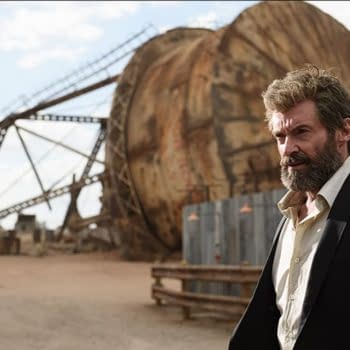
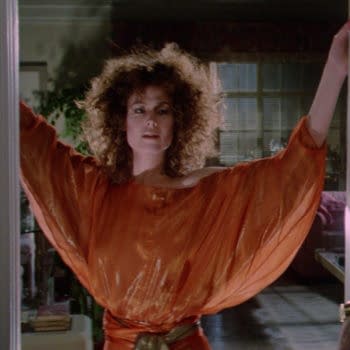
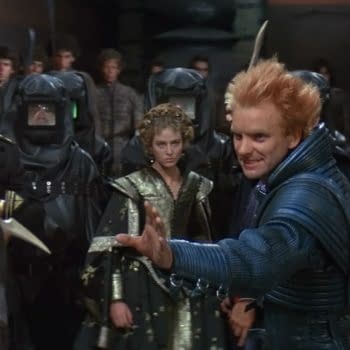
!['Rocketman' Soars With Warts and All Elton John Story [Review]](https://mlpnk72yciwc.i.optimole.com/cqhiHLc.IIZS~2ef73/w:350/h:350/q:75/rt:fill/g:ce/https://bleedingcool.com/wp-content/uploads/2019/01/rocketman.3-350x350.jpg)
